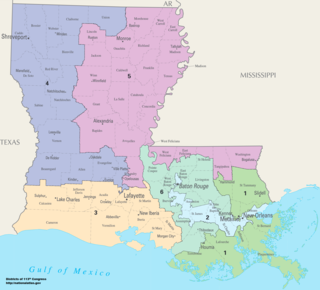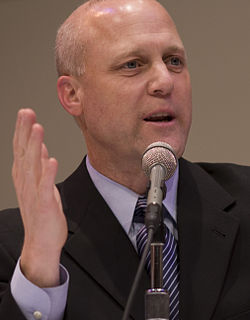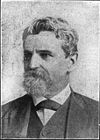
These are tables of congressional delegations from Louisiana to the United States House of Representatives and the United States Senate.

The first round of the Louisiana House election of 2006 were held on Tuesday, November 7, 2006. The terms of all seven Representatives to the United States House of Representatives will expire on January 3, 2007, and will be put up for contest. The winning candidates will serve a two-year term from January 3, 2007 to January 3, 2009. If necessary, a runoff round will be held on December 9, 2006.

Louisiana Constitutional Amendment 1 of 2004, is an amendment to the Louisiana Constitution that makes it unconstitutional for the state to recognize or perform same-sex marriages or civil unions. The referendum was approved by 78% of the voters.

The 2007 United States elections were held on Tuesday, November 6. During this off-year election, the only seats up for election in the United States Congress were special elections held throughout the year. None of these congressional seats changed party hands. There were also several gubernatorial races and state legislative elections, and numerous citizen initiatives, mayoral races in several major cities, and several types of local offices on the ballot.

The 2010 New Orleans mayoral election was held on February 6, 2010 to elect the Mayor of New Orleans, Louisiana. Incumbent Democratic Mayor Ray Nagin was term-limited and ineligible to run for re-election to a third term.

The Louisiana gubernatorial election of 1908 was held on April 21, 1908. Like most Southern states between Reconstruction and the civil rights era, Louisiana's Republican Party had virtually no electoral support. This meant that the Democratic Party primary held on January 28 was the real contest over who would be governor. This election marked the first time Louisiana used primaries to nominate party nominees. The election resulted in the election of Democrat Jared Y. Sanders, Sr. as governor of Louisiana.

The Louisiana gubernatorial election of 1904 was held on April 19, 1904. Like most Southern states between Reconstruction and the civil rights era, Louisiana's Republican Party had virtually no electoral support. As Louisiana had not yet adopted party primaries, this meant that the Democratic Party convention nomination vote was the real contest over who would be governor. The election resulted in the election of Democrat Newton C. Blanchard as governor of Louisiana.

The Louisiana gubernatorial election of 1900 was held on April 17, 1900. Like most Southern states between Reconstruction and the civil rights era, Louisiana's Republican Party had virtually no electoral support. As Louisiana had not yet adopted party primaries, this meant that the Democratic Party convention nomination vote was the real contest over who would be governor. However, Donelson Caffery, Jr. ran a strong third party campaign. The election resulted in the election of Democrat William Wright Heard as governor of Louisiana.

The Louisiana special gubernatorial election, 1830, was the sixth gubernatorial election to take place after Louisiana achieved statehood. Under Article III Sec 2 of the 1812 Constitution of the State of Louisiana the Governor was elected in two steps. On the first Monday in July, eligible voters went to the polls and voted. The returns were sent to the President of the Louisiana State Senate. On the second day of the session of the Louisiana State Legislature, the Louisiana House of Representatives and Senate met in joint session and voted between the top two candidates. The candidate who received a majority in General Assembly became governor. This particular election was called after the death of Governor Pierre Derbigny

The Louisiana gubernatorial election, 1842, was the ninth gubernatorial election to take place after Louisiana achieved statehood. Under Article III Sec 2 of the 1812 Constitution of the State of Louisiana the Governor was elected in two steps. On the first Monday in July, eligible voters went to the polls and voted. The returns were sent to the President of the Louisiana State Senate. On the second day of the session of the Louisiana State Legislature, the Louisiana House of Representatives and Senate met in joint session and voted between the top two candidates. The candidate who received a majority in General Assembly became governor. This was the last election held under the Constitution of 1812, the next election was held under the Constitution of 1845.

The Louisiana gubernatorial election, 1855, was the second election to take place under the Louisiana Constitution of 1852. As a result of this election Robert C. Wickliffe became Governor of Louisiana.

The Louisiana gubernatorial election, 1859, was the third election to take place under the Louisiana Constitution of 1852. As a result of this election Thomas Overton Moore became Governor of Louisiana. This was the last Louisiana gubernatorial election before the outbreak of the Civil War.

The Louisiana gubernatorial election, 1859, was the fourth election to take place under the Louisiana Constitution of 1852. As a result of this election Henry Watkins Allen became Governor of Confederate-controlled Louisiana.

The Louisiana gubernatorial election, 1864, was the first election to take place under the Louisiana Constitution of 1864. As a result of this election Michael Hahn became Governor of Union-controlled Louisiana.

The Louisiana gubernatorial election, 1865, was the second election to take place under the Louisiana Constitution of 1864. As a result of this election James Madison Wells was re-elected Governor of Louisiana. The result was a lop-sided result for Wells because many whites, who supported the Democratic Party, remained disqualified due to their support of the Confederacy. Nonetheless Democrats nominated fugitive former Governor Henry Watkins Allen.

The Louisiana gubernatorial election, 1868, was the first election to take place under the Louisiana Constitution of 1868. As a result of this election Henry C. Warmoth was elected Governor of Louisiana. At age 26 he was the youngest governor in the state's history. The result was a lop-sided result for Warmoth because of the Republican Party's overwhelming support amongst the freedmen who were the voting majority in the state at the time.

The Louisiana gubernatorial election, 1872, was the second election to take place under the Louisiana Constitution of 1868. As a result of this election William Pitt Kellogg was elected Governor of Louisiana, but not before federal troops stepped in to enforce his election. The results of this election were highly contentious and resulted in racial violence across the state. U. S. President Ulysses S. Grant had to step in and formally recognize Kellogg as Governor to resolve the violence. Kellogg's Democratic opponent John McEnery finally conceded the election in September 1874 after briefly overthrowing Kellogg's government.

The Louisiana gubernatorial election, 1876, was the third and final election to take place under the Louisiana Constitution of 1868. As a result of this election Francis T. Nicholls became Governor of Louisiana, but not before the election was contested by his opponent. The results of this election, like those of 1872 were disputed. The dispute was resolved by the Compromise of 1877 which gave the Governor's Mansion to Democrat Francis T. Nicholls. The Compromise also gave Republican presidential candidate Rutherford B. Hayes the electoral votes of several disputed states, including Louisiana, which resulted in his election to the White House. The election of Nicholls marked the end of Reconstruction in Louisiana and the decline of the Republican Party of Louisiana.

The Louisiana gubernatorial election, 1879, was the first election to take place under the Louisiana Constitution of 1879. As a result of this election Louis A. Wiltz became Governor of Louisiana. The election saw widespread intimidation of African-Americans which guaranteed the election of the Democratic nominee.

The Louisiana gubernatorial election, 1884, was the second election to take place under the Louisiana Constitution of 1879. As a result of this election Samuel D. McEnery was re-elected Governor of Louisiana. The election saw widespread intimidation of African-Americans which guaranteed the election of the Democratic nominee.









